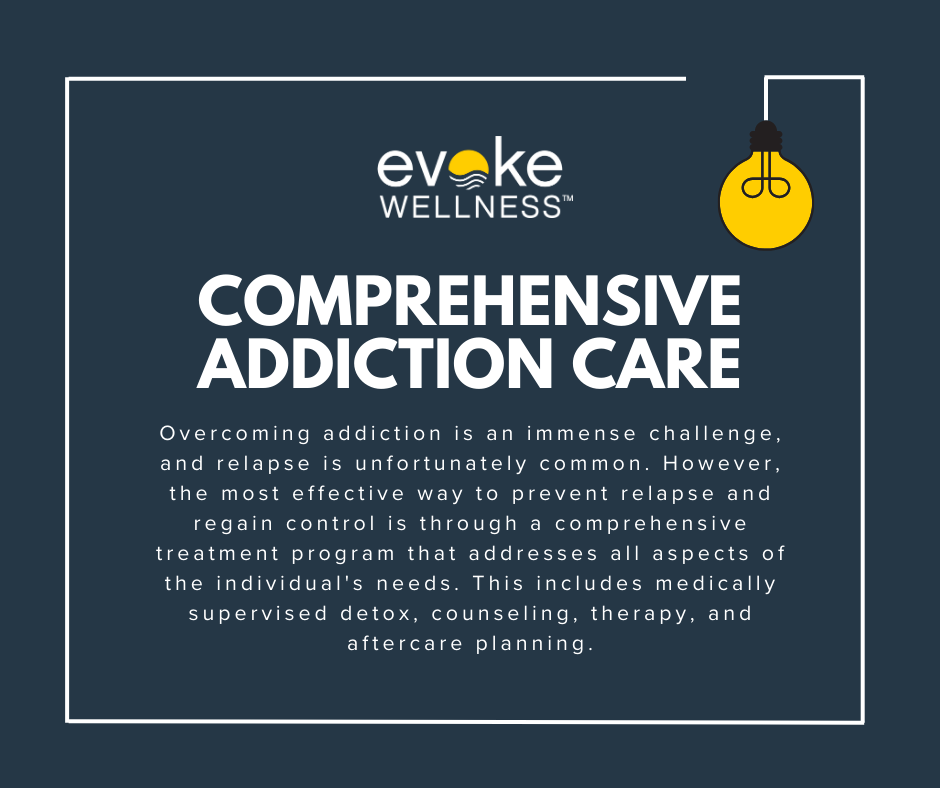Are you caught in a cycle of chronic relapse, struggling to maintain sobriety despite your best efforts? You’re not alone. Chronic relapse affects many individuals on the path to recovery, but there is hope. At Evoke Wellness at Cohasset, we understand the challenges you face and offer comprehensive detox programs tailored to address the unique needs of those experiencing repeated setbacks. Our evidence-based approach combines medical detox, therapy programs, and substance abuse treatment to help you regain control of your recovery journey. In this article, we’ll explore how a specialized detox program can be the crucial first step in breaking the cycle of chronic relapse and setting you on a path to lasting sobriety.
Together, let’s embrace the journey to recovery and the promise of a new beginning. Call us at (617) 917-3485 today or reach out online.
Understanding the Chronic Relapse Cycle
The Relapse Process
The path to addiction recovery is rarely linear. Many individuals struggle with chronic relapse, a cyclical pattern of substance abuse, brief sobriety, and subsequent return to addictive behaviors. This cycle is driven by a complex interplay of physical, psychological, and environmental factors.
Contributing Factors
- Physical Dependence: Prolonged substance abuse can lead to profound changes in brain chemistry, making it extremely difficult to break the physiological addiction without professional help. Medically-supervised detox is often necessary to manage withdrawal symptoms and facilitate a safe recovery.
- Mental Health Issues: Addiction frequently co-occurs with underlying mental health conditions like depression, anxiety, or trauma. Dual diagnosis treatment is crucial to address both the substance abuse and mental health aspects simultaneously.
- Environmental Triggers: Certain people, places, or situations can act as powerful reminders of past substance use, triggering intense cravings and increasing the risk of relapse. Comprehensive rehab programs help individuals develop coping strategies to navigate these triggers.
Breaking the Cycle
Overcoming chronic relapse requires a multifaceted approach that combines:
- Medical Intervention: Medication-assisted treatment (MAT) can help manage cravings and withdrawal symptoms, increasing the chances of sustained recovery.
- Behavioral Therapies: Evidence-based therapies like cognitive-behavioral therapy (CBT) and dialectical behavior therapy (DBT) equip individuals with tools to identify and modify unhealthy thought patterns and behaviors.
- Supportive Environment: Residential treatment programs provide a structured, substance-free environment and peer support network, fostering accountability and lasting lifestyle changes.
By understanding the chronic relapse cycle and its contributing factors, individuals can work closely with addiction professionals to develop personalized, comprehensive treatment plans tailored to their unique needs and circumstances.
The Importance of Medical Detox for Chronic Relapse
Safe and Supported Withdrawal
Attempting to detox from substances alone, especially after chronic relapse, can be extremely dangerous and life-threatening. According to Evoke Wellness, alcohol withdrawal carries risks like delirium tremens, high blood pressure, and seizures without proper medical care. A professional medical detox program provides round-the-clock supervision, medications to ease withdrawal symptoms, and a safe, supportive environment to stabilize physically and mentally.
Comprehensive Care Approach
Detox is the crucial first step, but comprehensive treatment is vital for lasting recovery from chronic relapse. Evoke Wellness emphasizes a full continuum of evidence-based services, transitioning seamlessly from detox into residential treatment, therapy, and aftercare planning. This integrated approach targets the physical, psychological, social, and behavioral aspects of addiction through modalities like CBT, DBT, and medication-assisted treatment.
Preventing Relapse Triggers
Chronic relapse is often driven by unaddressed root causes like trauma, mental health conditions, or unhealthy coping mechanisms. Medical detox programs help identify and manage these triggers through counseling, therapy, and lifestyle guidance. By building resilience and implementing relapse prevention strategies during detox, individuals can develop the tools to maintain sobriety long-term.
Specialized Care for Specific Substances
Certain substances like opioids, benzodiazepines, and prescription medications require specialized detox protocols. Evoke Wellness offers tailored programs like their heroin detox treatment that combine medications, behavioral therapies, and holistic support. Addressing the unique challenges of each substance through targeted care can significantly improve outcomes and reduce chronic relapse risks.
What is the Best Treatment for Relapse?

Medication-Assisted Treatment
One crucial component is medication-assisted treatment (MAT), which combines FDA-approved medications like buprenorphine or methadone with counseling and behavioral therapies. Studies show MAT significantly increases recovery rates compared to behavioral treatment alone for opioid addiction. These medications help reduce cravings and withdrawal symptoms, allowing individuals to fully engage in therapy.
Evidence-Based Therapies
Counseling and therapy are vital for addressing the psychological and behavioral roots of addiction. Cognitive-behavioral therapy (CBT) and dialectical behavior therapy (DBT) are evidence-based approaches that help individuals develop coping mechanisms, improve emotional regulation, and identify and change destructive thought patterns that can lead to relapse.
Holistic Support
In addition to traditional treatment modalities, many programs incorporate holistic practices like yoga, meditation, art therapy, and nutritional counseling. These can support physical, mental, and emotional healing while providing healthy outlets and coping strategies for managing stress and cravings.
Aftercare & Lifestyle Changes
Recovery doesn’t end with the completion of a treatment program. Ongoing aftercare support, such as sober living, alumni programs, and support groups, is crucial for preventing relapse and maintaining a recovery-focused lifestyle. Building a supportive network, managing triggers, and prioritizing self-care through exercise, nutrition, and stress management are all important components of long-term sobriety.
Addressing the Root Causes of Chronic Relapse
Identifying Underlying Mental Health Issues
Chronic relapse often stems from unresolved mental health conditions that fuel addictive behaviors. According to the National Institute on Drug Abuse, nearly half of individuals with substance use disorders also struggle with co-occurring mental illnesses like depression, anxiety, PTSD, or personality disorders. Comprehensive treatment must address these underlying issues through dual diagnosis care. This integrative approach combines psychotherapy, counseling, and medication management to simultaneously treat addiction and mental health conditions.
Developing Healthy Coping Strategies
Many individuals turn to substances as an unhealthy coping mechanism for stress, trauma, or negative emotions. Evoke Wellness’ sub-acute treatment services focus on equipping clients with positive coping strategies through evidence-based therapies like Cognitive Behavioral Therapy (CBT) and Dialectical Behavior Therapy (DBT). These approaches help individuals identify triggers, challenge negative thought patterns, and develop healthier ways to manage cravings and emotions without relying on substances.
Addressing Underlying Trauma
Unresolved trauma is a significant risk factor for substance abuse and chronic relapse. As highlighted on their website, Evoke Wellness emphasizes trauma-informed care to help clients process past experiences safely and develop resilience. Therapies like EMDR (Eye Movement Desensitization and Reprocessing) and trauma-focused CBT can effectively treat trauma, reducing the need for self-medication through substance abuse.
Fostering a Supportive Environment
Surrounding oneself with a positive, substance-free social network is crucial for sustained recovery. Evoke Wellness’ residential treatment program fosters a supportive community where clients can build healthy relationships, practice communication skills, and receive encouragement from peers on similar journeys. This supportive environment reinforces positive behaviors and provides accountability during the recovery process.
By comprehensively addressing the root causes of chronic relapse, individuals can break the cycle of addiction and embrace a fulfilling, substance-free life. Evoke Wellness’ holistic approach empowers clients to heal mind, body, and spirit, equipping them with the tools for lasting recovery.
Building a Strong Foundation for Long-Term Recovery
Creating a Comprehensive Aftercare Plan
A robust aftercare plan is crucial for maintaining sobriety after completing a detox or rehabilitation program. This comprehensive strategy should encompass ongoing support, counseling, and strategies to prevent relapse. According to the National Institute on Drug Abuse, effective aftercare can significantly improve long-term recovery outcomes.
Developing a Personalized Relapse Prevention Plan
Relapse is a common challenge in addiction recovery, but developing a personalized relapse prevention plan can help minimize this risk. This plan should identify potential triggers, outline coping strategies, and provide a roadmap for seeking support when needed. A study published in the Journal of Substance Abuse Treatment found that individuals who participated in relapse prevention therapy had significantly lower rates of substance use at follow-up compared to those who did not receive this intervention.
Cultivating a Strong Support System
Building a strong support system is vital for long-term recovery success. This can include joining a support group, such as Alcoholics Anonymous or Narcotics Anonymous, and fostering positive relationships with family, friends, and a sponsor. Research from the American Psychological Association highlights the importance of social support in promoting abstinence and reducing the risk of relapse.
Prioritizing Self-Care and Healthy Habits
Incorporating self-care practices and developing healthy habits can significantly contribute to a strong foundation for recovery. This may involve regular exercise, mindfulness practices, proper nutrition, and adequate sleep. A study published in the Journal of Substance Abuse Treatment found that individuals who engaged in regular physical activity and adopted a healthy lifestyle had better treatment outcomes and lower rates of relapse.
By implementing these strategies, individuals can build a strong foundation for long-term recovery, increasing their chances of maintaining sobriety and achieving a fulfilling, substance-free life.
Frequently Asked Questions: Detox for Chronic Relapse
Common Relapse Triggers
Relapsing into substance abuse after achieving sobriety is an unfortunate reality for many. Three key factors often contribute to this cycle: cravings triggered by stress, lack of effective coping mechanisms, and re-exposure to environments associated with past drug use. Chronic relapsers may struggle with any combination of these issues.
Why Detox is Critical
For those trapped in the relapse cycle, medically supervised detox provides a vital reset. Attempting to quit alone can be extremely dangerous due to potentially life-threatening withdrawal symptoms. Professional detox programs offer around-the-clock care to safely manage discomfort while addressing any co-occurring mental health concerns fueling the addiction.
Benefits of Professional Help
At Evoke Wellness, personalized treatment plans blend evidence-based therapies like CBT and DBT with holistic healing approaches. This comprehensive strategy equips chronic relapsers with the tools to identify triggers, develop healthier coping skills, and build a strong sober support network – empowering them to finally break free from the relapse cycle for good.
Insurance & Admissions Process
Many insurance providers cover the full continuum of care, from medically supervised detox to residential rehab programs. Evoke Wellness can verify benefits at no cost, streamlining the admissions process. Self-pay options are also available to ensure treatment is accessible to all who need it.
Conclusion
As you navigate the challenging path of recovery from chronic relapse, remember that detoxification is a crucial first step. By seeking professional help through Evoke Wellness at Cohasset’s comprehensive programs, you can safely manage withdrawal symptoms and lay the foundation for lasting sobriety. Our evidence-based approach combines medical detox, therapy, and ongoing support to address the complex nature of addiction. With the right tools and a commitment to change, you can break the cycle of relapse and reclaim control of your life. Take that brave first step today—your journey to sustained recovery begins with detox, and a brighter future awaits.
Begin Your Journey with Evoke Wellness at Cohasset
If you or a loved one is considering treatment, Evoke Wellness at Cohasset invites you to contact us. Our compassionate team is ready to answer your questions, discuss your needs, and help you take the first steps toward recovery. In Cohasset, you’ll find more than just a treatment program – you’ll discover a community dedicated to your wellness and success. Together, let’s embrace the journey to recovery and the promise of a new beginning. Call us at (617) 917-3485 today or reach out online.




